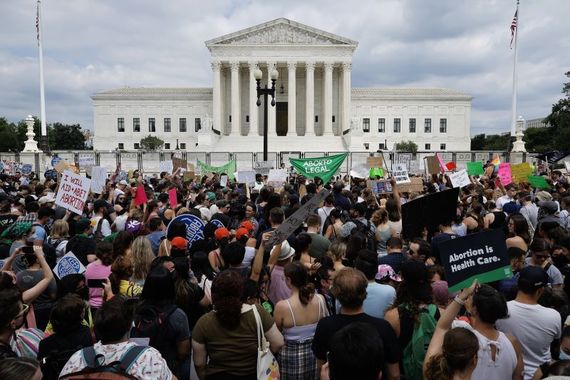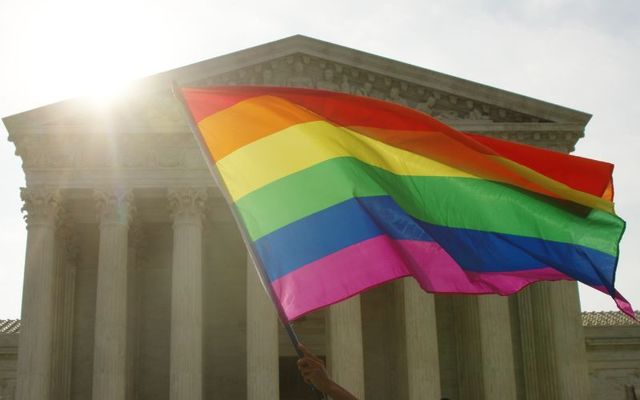As every woman in America was forced to learn last year, long-settled rights are no longer guaranteed under the current right-wing-dominated Supreme Court.
In Roe v Wade in 1973, the then Supreme Court decided that the right to privacy implied in the 14th Amendment had protected abortion as a fundamental right.
But in 2022, the conservative-heavy Supreme Court dramatically overturned that ruling, with Justice Clarence Thomas commenting that the Court should not stop there, and that it should also reconsider other landmark decisions that relied on similar constitutional foundations.
Thomas wrote: “For this reason, in future cases, we should reconsider all of this Court’s substantive due process precedents, including Griswold, Lawrence, and Obergefell.”

June 24, 2022: Thousands of abortion-rights activists gather in front of the US Supreme Court after the Court announced a ruling in the Dobbs v Jackson Women's Health Organization case in Washington, DC. The Court's decision in Dobbs v Jackson Women's Health overturns the landmark 50-year-old Roe v Wade case and erases a federal right to an abortion. (Getty Images)
Griswold versus Connecticut struck down state contraception bans via a constitutional right to privacy in 1965. Lawrence versus Texas struck down state “sodomy laws” and fully legitimized same-sex relationships in 2003. And Obergefell versus Hodges recognized same-sex marriages as constitutionally protected in 2015.
In short, Clarence called for the dismantling of over five decades of signature progressive legislation, rights that have always been opposed by the most far-right members of our judiciary and our far-right conservative political leadership.
Call it a counter-revolution, a retrograde threat to turn back the clock to 1950 and before, back to a time when LGBT people did not enjoy the legal rights they now do and when contraceptives and abortion were also illegal, making women more economically dependent on men by removing their ability to make their own reproductive choices.
With the court's decision to dramatically overturn constitutionally protected abortion rights, we have entered a radical and dangerous new era in which few longstanding precedents are now safe from the increasingly backward march of this conservative court.
In fact, Justice Thomas explicitly warned us in the ruling that “this isn't the end” of his shopping list, leaving the door open to come for rulings that the conservative justices have long opposed.

May 7, 2022: Abortion-rights supporters rally in Fort Lauderdale, Florida. (Getty Images)
Recall there was no compelling reason to overturn the 1973 abortion ruling, other than that it had been relentlessly opposed by some social conservatives, but nevertheless the court proceeded, creating unnecessary upheaval in our society.
“From the very moment of fertilization now, a woman has no rights to speak of,” wrote the dissenting justices. Even Chief Justice John Roberts remarked that there was no need for the Court to take this case because there was no disagreement in the lower courts about the case they had taken. So this is not an example of judicial restraint, Roberts wrote, this is the court wanting to do this.
An Idaho woman who is miscarrying and been denied an abortion because of state law has been documenting herself getting sicker and sicker over the last two days pic.twitter.com/CS72EYW6FG
— Jessica Valenti (@JessicaValenti) December 16, 2022
Because the threats made by this activist Court are now clear, the Democratically controlled Congress introduced the Respect for Marriage Act to help safeguard LGBTQ Americans from one of the threats that Justice Thomas made explicit.
If, as now seems likely, the Court were to revisit and overturn Obergefell at a later date, the legality of same-sex marriages would revert to state law and the majority of states would quickly prohibit it.
Unfortunately, the newly passed Respect for Marriage Act wouldn't change that fact, but it would require all states to recognize same-sex marriages performed in other states and to federally recognize these marriages.
So the Respect for Marriage Act is simply a backstop, it mandates that states respect these marriages. But some critics have called the bill the equivalent of getting the lifeboats prepared for the ship to go down.

(Getty Images)
If Obergefell is shockingly overturned by this back-to-the-future court, same-sex couples will maintain their spousal rights, which is critical to any marriage, especially in the case of a tragedy such as the hospitalization or death of a partner.
But the bill stops short of requiring all states to allow same-sex couples to get married in all states. It makes second-class citizens of all LGBTQ Americans again, making them the only minority in America whose marriages are relentlessly targeted by the courts.
Simply put, if the Supreme Court eventually overturns the Obergefell ruling that mandated marriage equality nationally, they will take us back to a time where, once again, LGBTQ people are second-class citizens who are given something that isn’t quite marriage, that isn’t quite as respected or protected.
Once again marriage would become a right that the Court offers to every person in this country equally - except to the LGBTQ community. For that reason, it can't be allowed to be overturned, and for the sake of democracy and the rule of law, it should never be.




Comments